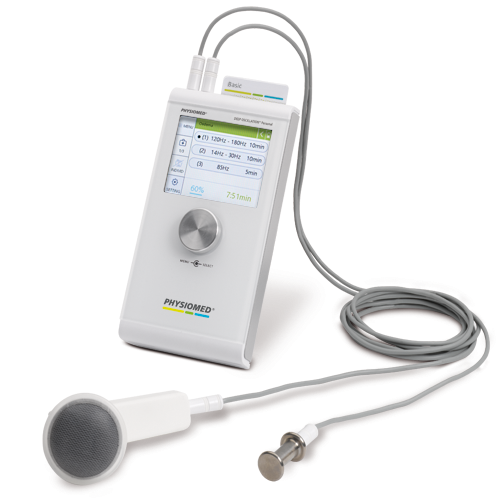DEEP OSCILLATION® Self Treatment Eases Symptoms of Irritable Bowel Syndrome - Patient Feedback
Miss C, who is 37 years old, was diagnosed with Irritable Bowel Syndrome (IBS) during her late adolescence, characterised by abdominal pain, bloating, constipation, and diarrhoea. In addition, she has visceral hypersensitivity in the soft organs of the abdomen and pelvic cavity, meaning her threshold for pain in these organs is lower than normal. This frequently occurs with IBS and other functional gastrointestinal diseases.
Miss C's ileocecal valve, the sphincter muscle situated at the junction of the ileum and the colon (video below) is dysfunctional and frequently spasms. Disordered defecation, flatulence, and bloating are symptoms she experiences. Emptying the bowel induces severe discomfort, nausea, and all-over body trembling. Unopened bowels cause daily abdominal pain. Miss C was keen to try Deep Oscillation as a non-invasive therapy to see if it could help reduce symptoms.
Current Medication
Prescribed
- Docusate 100mg daily and up to 1000mg when constipated (laxative and stool softener).
- Laxido sachet (laxative and stool softener)
- Sertraline, 100 mg a day
Supplementary
- Triple Action Biotic x 2 daily
- Magnesium and zinc: 266 mg x 2 daily
- Sertraline 100mg daily
Complementary Therapies
- Acupuncture
- Colonic irrigation
- Hypnotherapy
- Pressotherapy
- Reflexology
INTRODUCING NON-INVASIVE DEEP OSCILLATION®

Deep Oscillation Personal Loan for two months from October 28 to December 31, 2023
Self-treatment was carried out with a 5 cm oscillator head using the traumatic pain programme, working in the direction of intestinal peristalsis to provide relaxation of the stomach muscles, reduce pain and bloating and hopefully, stimulate colonic motility.
Patient feedback after one day
'I love it; it is so relaxing. I did 15 minutes of Deep Oscillation, followed by 15 minutes of hypnotherapy, while lying on my heated blanket. Perhaps too much detail, but the trapped wind was released and a bowel movement followed!'
Patient feedback after two months and the return of the unit
A huge thank you for introducing me to Deep Oscillation. After suffering excruciating pain in my stomach and trying all sorts of medications, I was willing to try almost anything. I didn’t know what to expect, but I was so happy with the treatment. It's pain-free to apply and very relaxing, and I can feel the benefits instantly. It helped ease the pain and helped me go to the toilet with more regularity.
I started with 15 minutes daily and reduced it to every other day or three times weekly. The pain has lessened a lot. I can hear my stomach start making noises as soon as I start using it.
I would highly recommend anyone suffering from IBS pain and constipation to give this a try!
On January 31st, 2024, one month later, the Deep Oscillation Personal was re-loaned after PhysioPod® received the following message:
“I had a colonic ten days ago, and pressotherapy which helped, but I’ve not been to the toilet again for four days.
RESULT: After 15 minutes deep oscillation, the trapped wind was released, and a bowel movement ensued.

Irritable bowel syndrome (IBS) can significantly impact a person's quality of life in several ways. Individuals with IBS often experience chronic symptoms, such as abdominal pain, bloating, diarrhoea, or constipation, which can lead to physical discomfort and distress. This can result in limitations on daily activities, social interactions, and overall emotional well-being.
The unpredictable nature of IBS symptoms can also lead to anxiety and stress, as individuals may be concerned about managing symptoms in various social or work settings. These concerns and uncertainties about symptom management may result in a decreased quality of life and may lead to changes in lifestyle, including dietary restrictions or avoidance of certain activities.
Furthermore, IBS has been associated with an increased prevalence of mental health conditions, including depression and anxiety. This psychiatric comorbidity can further contribute to a decreased quality of life, as individuals with IBS may experience emotional distress and a reduced overall sense of well-being.
Overall, the multifaceted and chronic nature of IBS symptoms can significantly impact a person's social, emotional, and physical well-being, ultimately diminishing their overall quality of life.
Deep Oscillation therapy is a non-invasive, clinically proven treatment that utilises gentle, electromechanical electrostatic vibrations to target tissues deep in the body to a depth of 8 cm. While it has been used in various applications, there is limited scientific evidence specifically addressing its direct impact on colonic motility.
Deep Oscillation effect has been shown to have potential benefits in promoting circulation, reducing pain, localised oedema, and influencing muscle relaxation. These effects could theoretically have indirect implications for colonic motility, as improved circulation and reduced tension in the abdominal region may have an impact on the overall function of the colon. Nevertheless, specific research on the direct stimulation of colonic motility through deep oscillation therapy is still limited.
As always, it's advisable to consult with a healthcare professional or specialist to discuss the potential effects of any therapy on colonic motility and to explore the most appropriate treatment options for addressing gastrointestinal health concerns.


